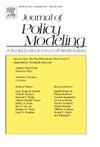Politically optimal lockdowns with vaccine hesitancy: Theory and evidence from Switzerland
IF 3.1
2区 经济学
Q1 ECONOMICS
引用次数: 0
Abstract
Literature on optimal lockdowns is abundant. However, when are lockdowns politically optimal? Specifically, is there a level of restrictions that a majority will be ready to tolerate, thereby minimising political conflict over optimal policy choices? The answers emerge from an extended voter preferences framework, where citizens living in a pandemic choose their vaccination status, and some are vaccine-hesitant. The model demonstrates that a society will be ready to tolerate harder restrictions when citizens are more productive or their vaccine salience is higher. However, the productivity and vaccine salience effects are mitigated by the government’s capacity for fiscal transfers. Similar to other political economy models of intra-pandemic societies, zero restrictions emerge as politically optimal in societies with sufficiently high vaccine hesitancy or low productivity. Canton-level evidence from the 2021 Swiss referendum on expanding COVID-19 restrictions offers strong support for the theory. A discussion of policy implications completes the analysis.
政治上最优的封锁与疫苗犹豫:来自瑞士的理论和证据
关于最佳封锁的文献很多。然而,什么时候封锁在政治上是最佳的?具体来说,是否存在一个多数人愿意容忍的限制水平,从而最大限度地减少围绕最优政策选择的政治冲突?答案来自一个扩展的选民偏好框架,在这个框架中,生活在大流行中的公民选择他们的疫苗接种状况,有些人对疫苗犹豫不决。该模型表明,当公民生产力更高或疫苗显著性更高时,社会将准备好容忍更严格的限制。然而,生产力和疫苗显著效应因政府的财政转移能力而减弱。与流行病内部社会的其他政治经济模式类似,在疫苗犹豫度足够高或生产力低下的社会中,零限制在政治上是最优的。2021年瑞士就扩大COVID-19限制进行的全民公决为这一理论提供了强有力的支持。对政策影响的讨论完成了分析。
本文章由计算机程序翻译,如有差异,请以英文原文为准。
求助全文
约1分钟内获得全文
求助全文
来源期刊

Journal of Policy Modeling
ECONOMICS-
CiteScore
6.20
自引率
11.40%
发文量
76
期刊介绍:
The Journal of Policy Modeling is published by Elsevier for the Society for Policy Modeling to provide a forum for analysis and debate concerning international policy issues. The journal addresses questions of critical import to the world community as a whole, and it focuses upon the economic, social, and political interdependencies between national and regional systems. This implies concern with international policies for the promotion of a better life for all human beings and, therefore, concentrates on improved methodological underpinnings for dealing with these problems.
 求助内容:
求助内容: 应助结果提醒方式:
应助结果提醒方式:


